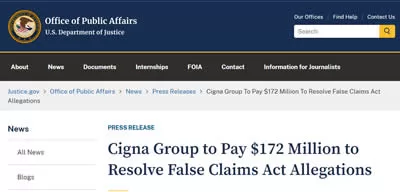The Cigna Group, headquartered in Connecticut, has agreed to pay $172,294,350 to resolve allegations that it violated the False Claims Act by submitting and failing to withdraw inaccurate and untruthful diagnosis codes for its Medicare Advantage Plan enrollees in order to increase its payments from Medicare.
Under the Medicare Advantage (MA) Program, also known as Medicare Part C, Medicare beneficiaries have the option of obtaining their Medicare-covered benefits through private insurance plans called MA Plans. The Centers for Medicare and Medicaid Services (CMS) pays the MA Plans a fixed monthly amount for each beneficiary who enrolls. CMS adjusts these monthly payments to account for various “risk” factors that affect expected health expenditures for the beneficiary, to ensure that MA Plans are paid more for those beneficiaries expected to incur higher healthcare costs and less for healthier beneficiaries expected to incur lower costs. To make these adjustments, CMS collects “risk adjustment” data, including medical diagnosis codes, from the MA Plans.
Cigna owns and operates MA Organizations that offer MA Plans to beneficiaries across the country. The United States alleged that Cigna submitted inaccurate and untruthful patient diagnosis data to CMS in order to inflate the payments it received from CMS, failed to withdraw the inaccurate and untruthful diagnosis data and repay CMS, and falsely certified in writing to CMS that the data was accurate and truthful. The settlement announced today resolves these allegations.
“Over half of our nation’s Medicare beneficiaries are now enrolled in Medicare Advantage plans, and the government pays private insurers over $450 billion each year to provide for their care,” said Deputy Assistant Attorney General Michael D. Granston of the Justice Department’s Civil Division. “We will hold accountable those insurers who knowingly seek inflated Medicare payments by manipulating beneficiary diagnoses or any other applicable requirements.”
The United States alleged that, for payment years 2014 to 2019, Cigna operated a “chart review” program, pursuant to which it retrieved medical records (also known as “charts”) from healthcare providers documenting services they had previously rendered to Medicare beneficiaries enrolled in Cigna’s plans. Cigna retained diagnosis coders to review those charts to identify all medical conditions that the charts supported and to assign the beneficiaries diagnosis codes for those conditions. Cigna relied on the results of those chart reviews to submit additional diagnosis codes to CMS that the healthcare providers had not reported for the beneficiaries to obtain additional payments from CMS. However, Cigna’s chart reviews also did not substantiate some diagnosis codes that were reported by providers and previously submitted by Cigna to CMS. Cigna did not delete or withdraw these inaccurate and untruthful diagnosis codes, however, which would have required Cigna to reimburse CMS. Thus, the United States alleged that Cigna used the results of its chart reviews to identify instances where Cigna could seek additional payments from CMS, while improperly failing to use those same results when they provided information about instances where Cigna was overpaid.
“Given the growth of Medicare Advantage plans, investigating fraud involving Medicare Part C is more important than ever. My office has prioritized combatting Medicare Advantage fraud, including applying data-driven investigative methods and working extensively with our law enforcement partners across the country,” said U.S. Attorney Jacqueline C. Romero of the Eastern District of Pennsylvania. “We will hold accountable those who report unsupported diagnoses to inflate Medicare Advantage payment, such as unsupported diagnosis codes for morbid obesity.”
The United States further alleged that Cigna reported diagnosis codes to CMS that were based solely on forms completed by vendors retained and paid by Cigna to conduct in-home assessments of plan members. The healthcare providers (typically nurse practitioners) who conducted these home visits did not perform or order the diagnostic testing or imaging that would have been necessary to reliably diagnose the serious, complex conditions reported, and were in many cases prohibited by Cigna from providing any treatment during the home visits for the medical conditions they purportedly found. The diagnoses at issue were not supported by the information documented on the forms completed by the vendors and were not reported to Cigna by any other healthcare provider who saw the patient during the year in which the home visit occurred. Nevertheless, Cigna submitted these diagnoses to CMS to claim increased payments, and falsely certified each year that the diagnosis data it submitted was “accurate, complete, and truthful.”
“For years, Cigna submitted to the Government false and invalid diagnosis information for its Medicare Advantage plan members. The reported diagnoses of serious and complex conditions were based solely on cursory in-home assessments by providers who did not perform necessary diagnostic testing and imaging. Cigna knew that these diagnoses would increase its Medicare Advantage payments by making its plan members appear sicker,” said Damian Williams, United States Attorney for the Southern District of New York. “This Office is committed to holding insurers accountable if they seek to manipulate the Medicare Advantage Program and boost their profits by submitting false information to the Government.”
“Medicare Advantage relies on the integrity of its insurers and the accuracy of the diagnosis code information they provide, since it has an outsize effect on Medicare payments,” said Henry C. Leventis, United States Attorney for the Middle District of Tennessee. “We will continue to vigorously pursue fraud in this increasingly important program.”
The United States further alleged that, for payment years 2016 to 2021, Cigna knowingly submitted and/or failed to delete or withdraw inaccurate and untruthful diagnosis codes for morbid obesity to increase the payments it received from CMS for numerous beneficiaries enrolled in its MA plans. The medical records for individuals diagnosed as morbidly obese typically include one or more Body Mass Index (BMI) recordings. Individuals with a BMI below 35 cannot properly be diagnosed as morbidly obese. However, Cigna submitted or failed to delete inaccurate and untruthful diagnosis codes for morbid obesity for individuals lacking a BMI of 35 or above, and these codes increased the payments made by CMS.
In connection with the settlement, Cigna entered into a five-year Corporate Integrity Agreement (CIA) with the U.S. Department of Health and Human Services Office of Inspector General (HHS-OIG). The CIA requires that Cigna implement numerous accountability and auditing provisions. On an annual basis, top executives and members of the Board of Directors must make certifications about Cigna’s compliance measures, Cigna must conduct annual risk assessments and other monitoring, and an independent review organization will conduct multi-faceted audits focused on risk adjustment data.
“Medicare Advantage plans that submit false information to increase payments from CMS show blatant disregard for the integrity of these vital federal health care funds,” stated Christian J. Schrank, Deputy Inspector General for Investigations with HHS-OIG. “Such actions are an affront to the Medicare program and the millions of patients who rely on its services. Working with our law enforcement partners, our agency will continue to prioritize investigating alleged fraud that targets the Medicare Advantage program.”
The civil settlement of the home visit allegations includes the resolution of claims brought under the qui tam or whistleblower provisions of the False Claims Act by Robert A. Cutler, a former part-owner of a vendor retained by Cigna to conduct home visits. Under those provisions, a private party can file an action on behalf of the United States and receive a portion of any recovery. The qui tam case is captioned United States ex rel. Cutler v. Cigna Corp., et al., No. 3:21-cv-00748 (M.D. Tenn.). As part of today’s resolution, Mr. Cutler will receive $8,140,000 from the settlement of the home visit allegations.
The resolution obtained in this matter was the result of a coordinated effort between the Justice Department’s Civil Division, Commercial Litigation Branch, Fraud Section, and the United States Attorneys’ Offices for the Eastern District of Pennsylvania, the Southern District of New York and the Middle District of Tennessee, with assistance from HHS-OIG.
The investigation and resolution of this matter illustrate the government’s emphasis on combating healthcare fraud. One of the most powerful tools in this effort is the False Claims Act. Tips and complaints from all sources about potential fraud, waste, abuse and mismanagement, can be reported to the Department of Health and Human Services at www.oig.hhs.gov/fraud/report-fraud/ or 800-HHS-TIPS (800-447-8477).
The matter was handled by Fraud Section Attorneys Carol Wallack and Edward Crooke and Assistant U.S. Attorneys Deborah Frey, Matthew Howatt and Gregory David from the Eastern District of Pennsylvania, Jeffrey Powell, Peter Aronoff, Jean-David Barnea, and Samuel Dolinger from the Southern District of New York, and Ellen Bowden McIntyre from the Middle District of Tennessee.
The claims resolved by the settlement are allegations only and there has been no determination of liability.
Updated September 30, 2023
U.S. Department of Justice
Source: justice.gov – Midtown Tribune news –
Big New York news BigNY.com –














